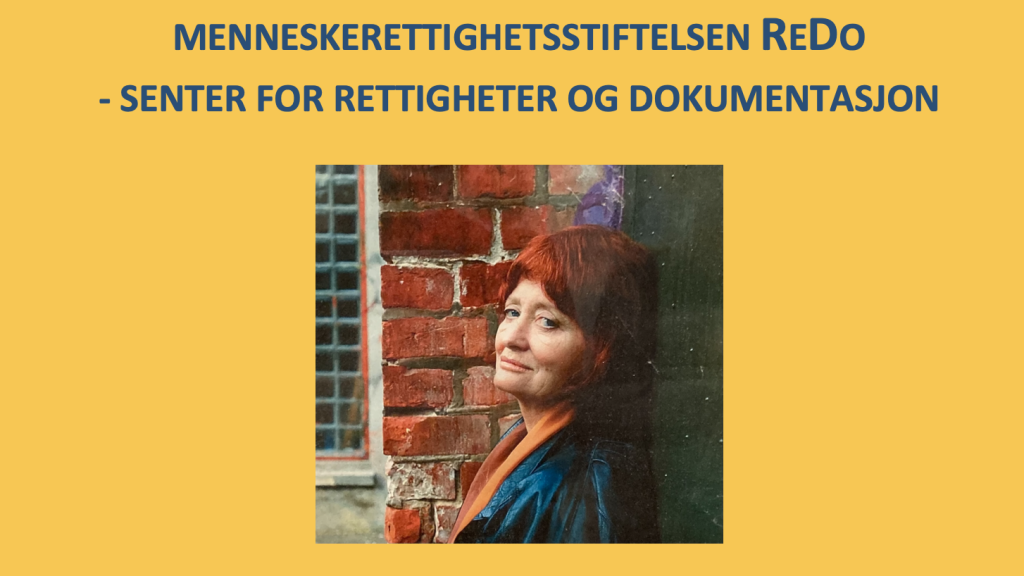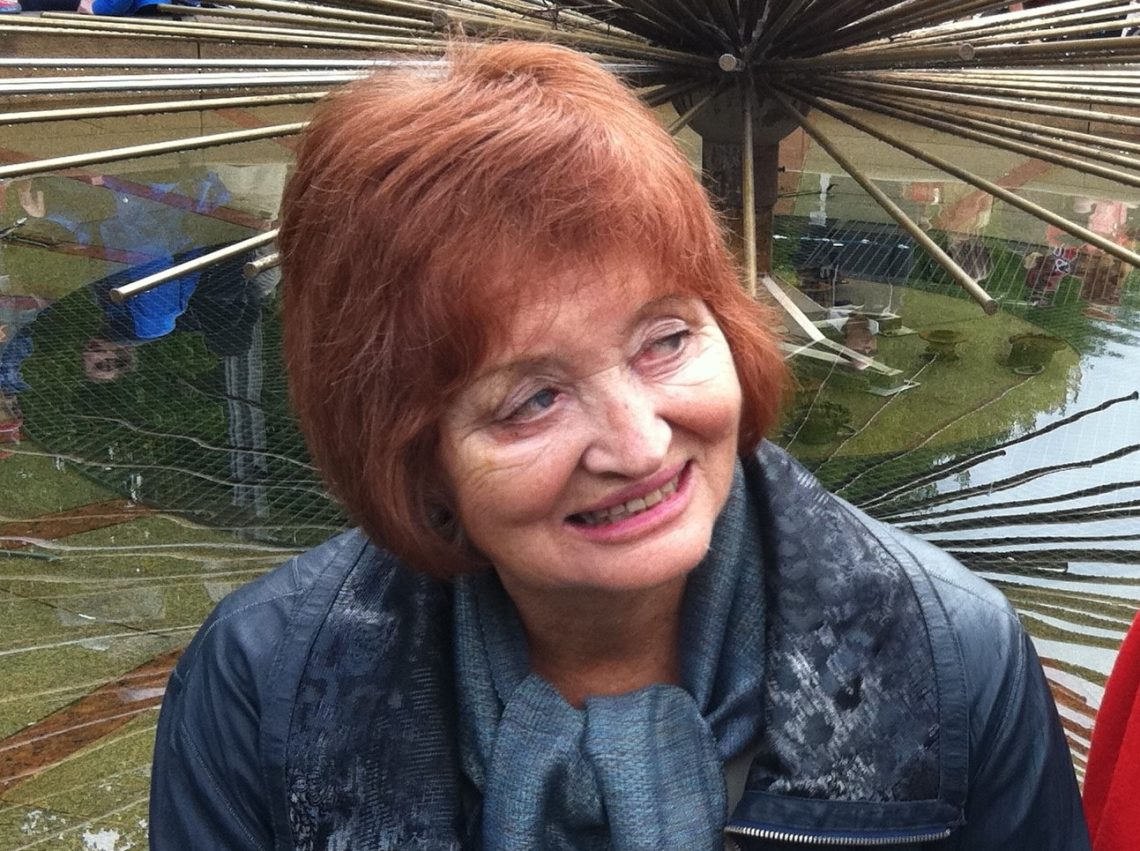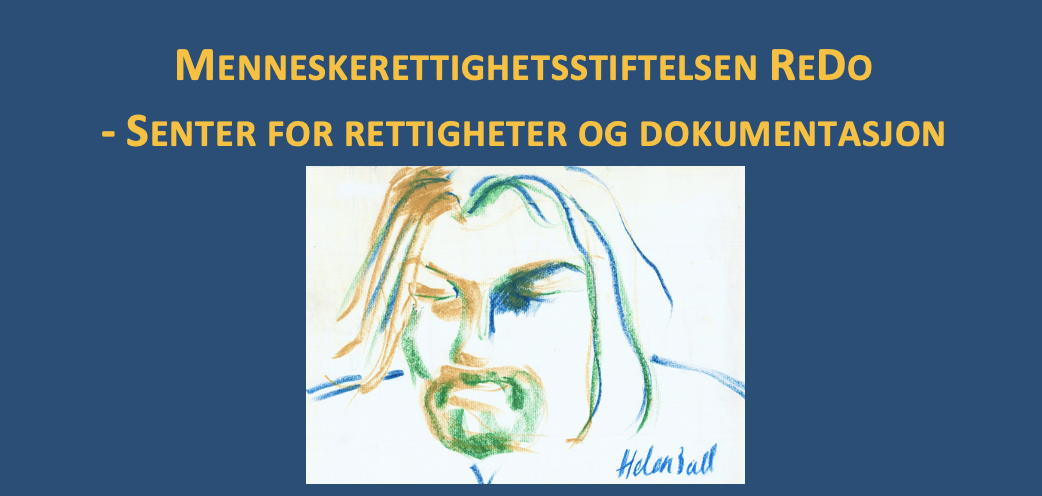-
The winner of Ketil Njaa Solberg’s Human Rights Award 2024 is Tina Minkowitz.
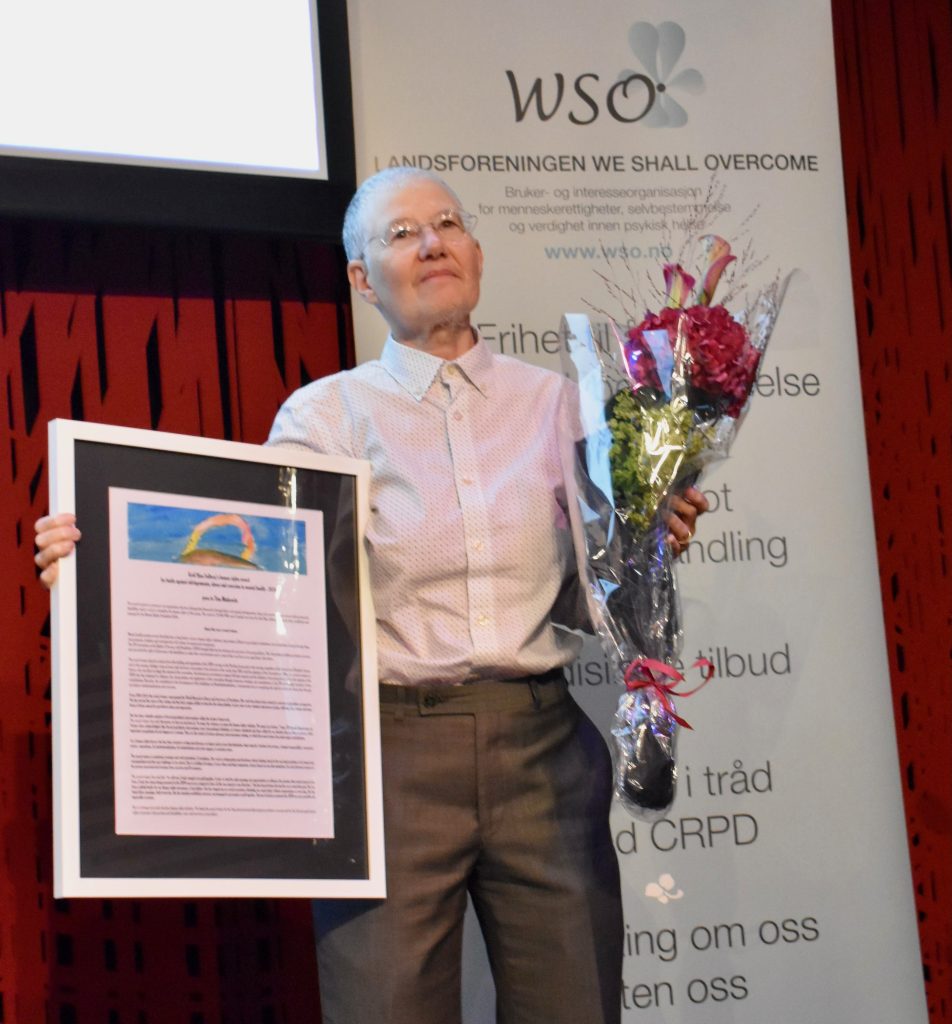
Tina Minkowitz. Foto: Anthonie Opsahl Schnell The «Ketil Njaa Solberg Human Rights Award for the fight against violations, abuse and coercion in mental health care» has been established in memory of Bjørg Njaa’s son Ketil.
Here is the board of The Human Rights Foundation Redo’s justification for awarding this prize to Tina Minkowitz:
About the award
The award is given to a person or an organization who have distinguished themselves through their work against infringements, abuse and coercion against persons with psychosocial disabilities and/or work to strengthen the human rights of this group. The award is 20 000 NOK and is handed out from the Ketil Njaa Solberg’s memorial fund, established and managed by The Human Rights Foundation ReDo.
About this year’s award winner
Mental health systems across the globe have a long history of grave human rights violations; deprivations of liberty in psychiatric institutions, forced injections of mind-altering drugs, electroshocks, isolation and restraints have left victims devastated and traumatized.
The UN Convention on the Rights of Persons with Disabilities (CRPD) brought light into the darkness for survivors of forced psychiatry. The Convention prohibits psychiatric coercion and sets forth the right of all persons with disabilities to make their own decisions and to control their own lives on an equal basis with others.
The award winner played a central role in the drafting and negotiation of the CRPD, serving on the Working Group and on the steering committee of the International Disability Caucus, and in the process, leading a team of users and survivors of psychiatry from all parts of the world, from 2002 until the adoption of the Convention in 2006. At a crucial moment in history, she was there to shape the content of the convention, introducing key provisions to support full legal capacity and the abolition of forced psychiatry. Since the adoption of the CRPD she has continued to influence the interpretation and application of the convention through numerous meetings and consultations in the UN and through essential written contributions. Recently, she contributed to the development of the Guidelines on Deinstitutionalization, a monumental step in recognizing the right to redress for harm done through psychiatric institutionalization and coercion.
From 2002-2015 the award winner represented the World Network of Users and Survivors of Psychiatry. Her work has always been rooted in a survivor of psychiatry perspective. She has carried the voice of the victims and has had a unique ability to describe the indescribable, to give voice to our common experiences of pain, suffering, fear, trauma and many forms of harm caused by psychiatric abuse and oppression.
She has done valuable analysis of forced psychiatric interventions within the torture-framework.
The award winner has said: the power we have as survivors is “to name the violence, to name the human rights violation. We name it as torture.” Later, UN Special Rapporteurs on Torture have acknowledged that forced psychiatric interventions meet international definition of torture standards and have called for an absolute ban on these practices. Such important recognitions do not happen in a vacuum. They are the result of tireless advocacy and awareness-raising, to which the award winner has made major contributions.
As a human rights lawyer she has done extensive writing and advocacy on topics such as non-discrimination, legal capacity, freedom from torture, criminal responsibility, restorative justice, reparations, de-institutionalization, de-medicalization and crisis support, to mention some.
The award winner is analytical, strategic and well-articulated. A freethinker. Her work is independent and forefront, always looking ahead at the next legal problem to be framed and conceptualized and the next challenge to be solved. She is a brilliant developer of new ideas and legal arguments, always based on non-discrimination, free and informed consent of the person concerned and freedom from coercion and ill-treatment.
The award winner has said that “we will win, if only enough of us pull together, if only we find the right openings and opportunities to influence the systems that control much of our lives, if only the vision being promoted in the CRPD can act as a magnet to draw all the iron shards in one direction”. She has herself taken the lead for us to reach that goal. She has been a global leader for our human rights movement, a front fighter who has stepped up on crucial occasions, defending our equal rights without compromises or wavering. She has found those openings, built networks, like the absolute prohibition network, and managed to get people to pull together. She has tirelessly promoted the CRPD on every possible and impossible occasion.
She is a strong voice and a fearless human rights defender. We thank the award winner for her long and persistent fight against psychiatric coercion and for the full and equal human rights of persons with psychosocial disabilities, users and survivors of psychiatry.
The Ketil Njaa Solberg’s Human Rights Award 2024 goes to Tina Minkowitz.Award ceremony
The award ceremony took place at the Human Rights Foundation Redo’s conference «Ending psychiatric coercion – urgent need for effective remedies and reparations» September 10th 2024.
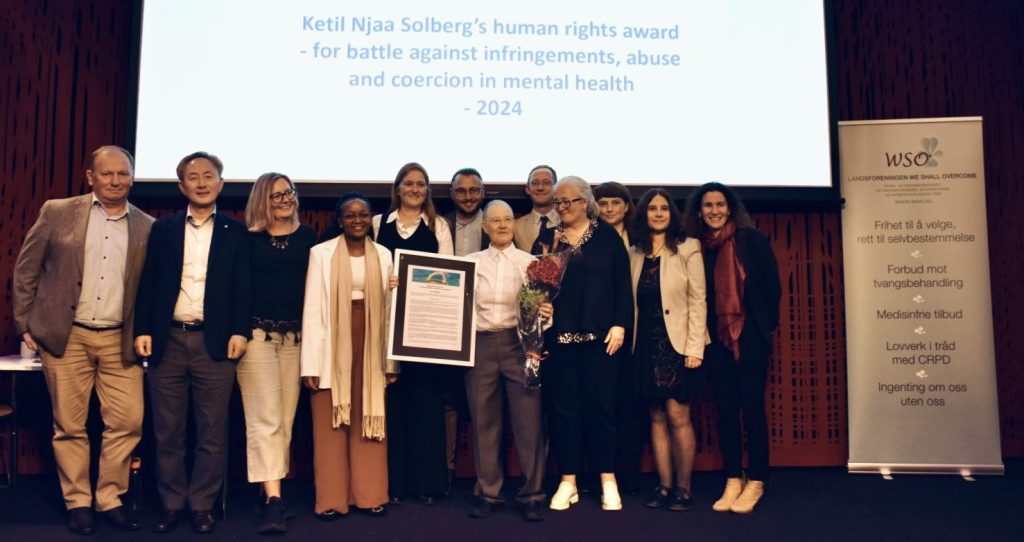
The award winner Tina Minkowitz surrounded by the speakers and organisers of the conference. Foto: Anthonie Opsahl Schnell -
Beskyttet: Conference 10.09.24, for registered participants
-
Ending psychiatric coercion – urgent need for effective remedies and reparations
Conference September 10th
Organized by the Human Rights Foundation ReDo
Place: Litteraturhuset, Wergelandsveien 29, Oslo and online
Date: Tuesday 10 September 2024
Time: 9 – 16.30
The aim of The Human Rights Foundation ReDo is to work against infringements, abuse, and coercion in the mental health system and to strengthen the human rights of persons with psychosocial disabilities, in line with the UN Convention on the Rights of Persons with Disabilities (CRPD). Work is centred on documentation of human rights violations in the mental health system and support for strategic litigation. ReDo organizes an annual conference where a human rights award is given.

This year’s conference focuses on ending psychiatric coercion and remedies and reparations needed for these human rights violations, and is co-organized by WSO – We Shall Overcome, Norway.[i]
-
Bjørg Njaa, 2018; Hvordan kan helsepersonell påføre sine pasienter skader og mene at det er forsvarlig?
I dag ville vi ha feiret Bjørgs 82-årsdag om hun fremdeles hadde levd. Vi tenker på henne med sorg og savn, men også med dyp takknemlighet. Menneskerettighetsstiftelsen ReDo bygger videre på Bjørgs omfattende arbeid over mange år. Hun var en aktiv debattant og var raskt ute med leserinnlegg når noe provoserte henne. Hun kom også ofte på trykk. Vi deler i dag et debattinnlegg hun skrev i 2018, som dessverre er like aktuelt i dag.
Bildet av henne (over) er fra 17. mai 2015 (foto Siri Lill Thowsen).
-
Ragnfrid Kogstad ble den første vinner av «Ketil Njaa Solbergs menneskerettighetspris»

«Ketil Njaa Solbergs menneskerettighetspris for kamp mot krenkelser, overgrep og tvang i psykisk helsevern» er opprettet til minne om Bjørgs Njaas sønn Ketil. Utdelingen ble gjort under åpningsseminaret til Menneskerettighetsstiftelsen ReDo på Litteraturhuset i Oslo den 25. mars.
Her er styret i Menneskerettighetsstiftelsen Redo sin begrunnelse for å gi denne første prisen til Ragnfrid Kogstad:Om prisen
Prisen deles ut til en person eller organisasjon som har utmerket seg gjennom sitt arbeid mot krenkelser, overgrep og tvang overfor personer med psykososial funksjonsnedsettelse og/eller arbeid for styrking av denne gruppens menneskerettigheter. Prissummen er på kr. 20000 og deles ut fra Ketil Njaa Solbergs minnefond, opprettet og forvaltet av Menneskerettighetsstiftelsen ReDo. Prisen deles ut under en årlig markering som setter fokus på prisens formål og hedrer mottakeren av prisen for sitt bidrag i menneskerettighetskampen.
-
Åpningsseminar 25. mars
Kampen mot krenkelser, overgrep og tvang – dokumentasjon av menneskerettighetsbrudd i psykisk helsevern
Lørdag 25. mars fra kl. 11–16 i Skram-salen på Litteraturhuset i Oslo.Dørene åpnes 10:30 med levende musikk.
Menneskerettighetsstiftelsen ReDo ble opprettet ved testamente av Bjørg Njaa (18.03.1942 – 23.11.2021). Hun etterlot hele sin formue til stiftelsens formål, som er å holde minnet om Bjørg Njaas sønn, Ketil Njaa Solberg (15.09.1973 – 01.02.1999), levende.
Vi vil i dette åpningsseminaret trekke trådene fra arbeidet som er gjort over mange år og peke frem mot hva som må gjøres videre. Vi vil fortelle om bakgrunnen for opprettelsen av Stiftelsen ReDo, og også gi rom til å hedre Bjørgs store innsats. Vi vil ha første utdeling av «Ketil Njaa Solbergs menneskerettighetspris for kamp mot krenkelser, overgrep og tvang i psykisk helsevern», som er opprettet til minne om Bjørg Njaas sønn Ketil.
Seminaret er gratis og åpent for alle, uten påmelding. Last ned invitasjonen her.
Det vil holdes innlegg ved:
Hege Orefellen, Styreleder for Menneskerettighetsstiftelsen ReDo. Jurist og jobber med en doktorgrad ved Centre for Disability Law and Policy, University of Galway, Ireland. Har i mange år engasjert seg i menneskerettighetskampen og arbeidet for opphør av frihetsberøvelse, tvangsbehandling og annen tvangsbruk i psykisk helsevern.
Ketil Lund, advokat og tidligere Høyesterettsdommer. Har gjennom et langt yrkesliv engasjert seg i spørsmål om bruk av tvang, og særlig tvangsmedisinering, i psykisk helsevern. Er bl.a. engasjert i ICJs pro bono-prosjekt som fører saker for retten, med mål om å få fastslått menneskerettighetsbrudd i forbindelse med frihetsberøvelse, tvangsbehandling og andre tvangsinngrep i psykisk helsevern.
Gro Hillestad Thune, advokat og tidligere norsk medlem av Den europeiske menneskerettighets-kommisjonen (oppgavene til kommisjonen ble senere overtatt av Den europeiske menneskerettighets-domstolen). Har i mange år arbeidet med å få menneskerettigheter på dagsorden og inn i norsk rett og praksis, og har vært særlig opptatt av bruk av tvang i psykisk helsevern. Har gitt ut boken «Overgrep – søkelys på psykiatrien», hvor nærmere 70 fortellinger om krenkelser og overgrep i psykisk helsevern dokumenteres.
Ragnfrid Kogstad, sosiolog og professor emeritus i psykisk helsearbeid ved Høgskolen i Innlandet. Har en doktorgrad med tittel «Fortellinger fra andre posisjoner. Med brukererfaring fra psykisk helsefeltet og en gyldig stemme i politikk og kunnskapsdannelse», basert på flere hundre historier fra personer med erfaringer fra psykisk helsevern. Engasjert innenfor etikk, menneskerettigheter, forskning og dokumentasjon av krenkelser, overgrep og tvang i psykisk helsevern.
Sunniva Ørstavik, sosiolog med lang erfaring fra likestillings- og diskrimineringsfeltet. Tidligere bl.a generalsekretær i Rådet for psykisk helse og Norges Handikapforbund. Likestillings- og diskrimineringsombud fra 2010-2016.
